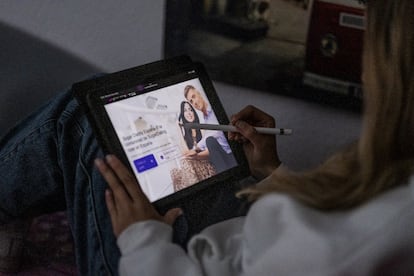Sugar dating, the romanticized face of prostitution
Three young people talk about their experiences spending time with older men in exchange for money, gifts and vacations


There are numerous websites that connect wealthy middle-aged men with young, not-so-wealthy girls. The men on these sites are known as sugar daddies, while the young women are dubbed sugar babies. But despite the name, there is very little that is sweet about these relationships. Many of the women are struggling financially and are often coerced into having sex. This is the world of sugar dating, a phenomenon that many consider just another form of prostitution.
Ana (an assumed name to maintain her anonymity) was 18 years old and struggling financially due to family problems when she decided to create a profile on the sugar dating app Seeking Arrangements. She was feeling overwhelmed and wanted some easy money. Her friends even encouraged her, arguing that perhaps she wouldn’t have to have sex with anyone. She had a relationship with a nearly 50-year-old man, who was a senior officer of a well-known company. Before meeting the first time, he transferred €50 to her account. When they got to dinner, he transferred another €50. When he drove her home, another €50. And when they finished having sex, another €50. “It was as if my body didn’t belong to me, I didn’t know what I was doing. He took control of the entire date and I did not know how to set limits to say no,” says Ana. “But I, like many other girls, had already slept with people without really wanting to, and I thought: ‘At least now I’m getting paid.’ Being a prostitute sounds bad, but being a sugar baby might sound cool. That’s why I think it so dangerous.”
Eva Márquez, the human trafficking coordinator of the NGO Diaconia in Spain, says she realized how serious the problem was when she went to high schools and saw that “many young women aspired to be sugar babies.” “We firmly believe that this is one of many masked and glamorized forms of prostitution,” she says. “There is a pimp industry that is profiting from all this.”
Television series and movies, such as Netflix’s Baby, often depict sugar daddy relationships in a positive or romantic light. The young women are seen traveling, shopping and receiving beautiful gifts from their sugar daddies. “It’s nothing new,” says Márquez. “We all know the movie Pretty Woman and how a relationship that is basically sugar dating was romanticized,” she says, pointing out that sugar dating websites are filled with images of luxury bags, expensive cars and decadent experiences. “They sell the idea that the victim is always in control.”
It’s free to register on these websites and apps, and there are few security checks. Most of the men in the profiles are between the ages of 35 and 60. Some pose shirtless while doing a handstand in a beach house, others lean against high-end cars and show off skintight suits. A few have photos of themselves skiing. “I am a Spanish businessman looking for a romantic girl who is willing to jump on a plane and go to the end of the world just to see me,” reads the description of one man’s profile. Other profiles have messages such as: “I’m looking for someone discreet” and “Attractive man with money, wanting to help those who need it.” Each profile even has a section where the men list their net worth and annual income, which some list as up to $800,000.
“It’s a prostitution page,” says Ana. “Many are very wealthy gentlemen, but there are also normal people. A high school language and literature teacher even spoke to me once.” She remembers one occasion when, while having sex with a man who had paid for her, she had to run to the bathroom because she wanted to vomit. It was months before she could be intimate again with another person. “I’m a normal girl, who studies, and without intending to be, I was a prostitute. It can happen to anyone, just like it happened to me.”
But not all sugar dating experiences lead to sex. Sofía (not her real name) spent her 20th birthday on a yacht in Ibiza, in Spain’s Balearic Islands, thanks to an invitation from a sugar daddy. She got in touch with him via Seeking Applications, the same app Ana used. “He told me he had a beautiful apartment in Barcelona and I agreed [to go],” she says. When she arrived, the apartment was filled with bottles of champagne, wine, snacks, and there were four other girls. “We went out for a walk and to dinner, and we ended up in the VIP section of a club. Of course, he paid for it all,” she recalls.
While Ana was in contact with several sugar daddies over a short period of time, Sofía had longer relationships, but just with one man at a time because it was too draining, she says. “Many of them are real whiners, they are psychologically and emotionally needy,” she explains. “They are paying for your time and availability.” Unlike Ana’s experience, Sofia’s sugar daddies never tried to have sex with her. “They weren’t gentlemen, but they didn’t harass me either. If I said no, it meant no.”
“Maybe not everyone coerces you into having sex, but still a sugar baby is still selling her sexual appeal so that a man with money can show her off to his co-workers,” says Ana. That’s exactly what they were looking for in Sofía, who says she was able to “keep her head on her shoulders.” “If you are paid a minimum of €1,000 every time you meet them, never accept less than that. And if €1,000 makes you feel bad, ask for more,” she says. Last August, a man reported to EL PAÍS that he had been cheated out of €8,100 by a woman who claimed to be a sugar baby. “I think it’s not all bad and that it’s normal that there are girls who make those decisions,” says Ana.
The app Seeking Arrangements has more than 40 million active users all over the world. In 2018, the company rebranded as Seeking, and tightened its security policy in a bid to move away from the sugar dating world. The firm says it has invested a lot of money in sex education and promoting healthy relationships. “We review over 100,000 pieces of content a day and have an amazing self-monitoring community that reports potential misconduct 24 hours a day. Those who break the rules are automatically kicked out of the website,” says Seeking. However, when creating an account, users must still identify as either “successful members” or “attractive members,” and the profiles of men looking for partners continue to list their net worth.
Registration on dating websites is voluntary, meaning they cannot be considered illegal. “They look for loopholes to justify that what they do is legal, and they are very careful to present themselves as pages that do not accept minors, or in which sex is exchanged for something prohibited,” explains Márquez.
Sugar babies can be paid in cash, bank transfers, gifts or experiences. Carlos (not his real name) was never short of money, but he wanted to save. At the age of 18, some friends introduced him to a man in his 40s. They called him “The Godfather.” “Obviously, all of us had vested interests,” he explains. “When we wanted to continue partying, he rented hotel suites so that several people could party in the jacuzzi.” He never asked for anything sexual in return.
But these relationships are typically founded on unequal power relations, where the sugar daddy has more control than the baby. “There are men who use and abuse that power, and take advantage of the economic need of young women,” says sociologist Beatriz Ranea. The sugar dating world is dominated by sugar daddies. Of the 24 million users on Seeking, only one million are sugar mommies.
“When they pay you €50 every time you get closer and closer to having a sexual relationship, you are not free,” says Ana. She says that she often pretended she had her period to get out of having sex with them, but they didn’t seem to care. One sugar daddy invited her to move in with him and said he would pay for all her expenses, claiming that he was terminally ill. Another paid her according to how many intimate photos she sent. Ana earned around €700 a month. “I’d never seen so much money at the same time,” she says, adding that she could have made more if she hadn’t turned down certain requests. “And to get more money, you just have to sexualize yourself as much as possible: be playful, put on red lipstick and all that stuff... They will think you are dumb for real.”
Emotional impact
Sofía was surprised when, during her vacation in Ibiza, one of the sugar daddies who was spending the summer with them bought a one-way plane ticket to bring a young woman from Romania to Spain. When the woman got to the yacht, he bought a return ticket, because “he didn’t like her.” To compensate for the girl’s time, he paid for a three-day vacation for her on the island. Sofía admits that while her experience was stimulating and gave her financial independence, she wouldn’t do it again. “With the work comes trauma, it’s something I had to accept,” she says. She says she now has trouble getting close to others, and trusting and relating to people.
Carlos says his experience was not bad. He admits that he was shocked to discover, days after a party, that some of the young men present were escorts who were paid for sex. “It was just a homosexual environment, in which we drank and chatted. I know that there are people who slept with him [the sugar daddy], but of their own free will,” he says.
For Ana, being a sugar baby has had a big effect on her personal life. She felt judged and, among other things, stopped reading. “I was trying to have long conversations [with the sugar daddies], so I wouldn’t go to bed with them. They told me that I was different from the others, well-read, very intelligent. I hate that I messed that part of me up. Now I can’t debate with my university friends, read or write without remembering that it was once what gave me sex appeal.”
Tu suscripción se está usando en otro dispositivo
¿Quieres añadir otro usuario a tu suscripción?
Si continúas leyendo en este dispositivo, no se podrá leer en el otro.
FlechaTu suscripción se está usando en otro dispositivo y solo puedes acceder a EL PAÍS desde un dispositivo a la vez.
Si quieres compartir tu cuenta, cambia tu suscripción a la modalidad Premium, así podrás añadir otro usuario. Cada uno accederá con su propia cuenta de email, lo que os permitirá personalizar vuestra experiencia en EL PAÍS.
¿Tienes una suscripción de empresa? Accede aquí para contratar más cuentas.
En el caso de no saber quién está usando tu cuenta, te recomendamos cambiar tu contraseña aquí.
Si decides continuar compartiendo tu cuenta, este mensaje se mostrará en tu dispositivo y en el de la otra persona que está usando tu cuenta de forma indefinida, afectando a tu experiencia de lectura. Puedes consultar aquí los términos y condiciones de la suscripción digital.








































